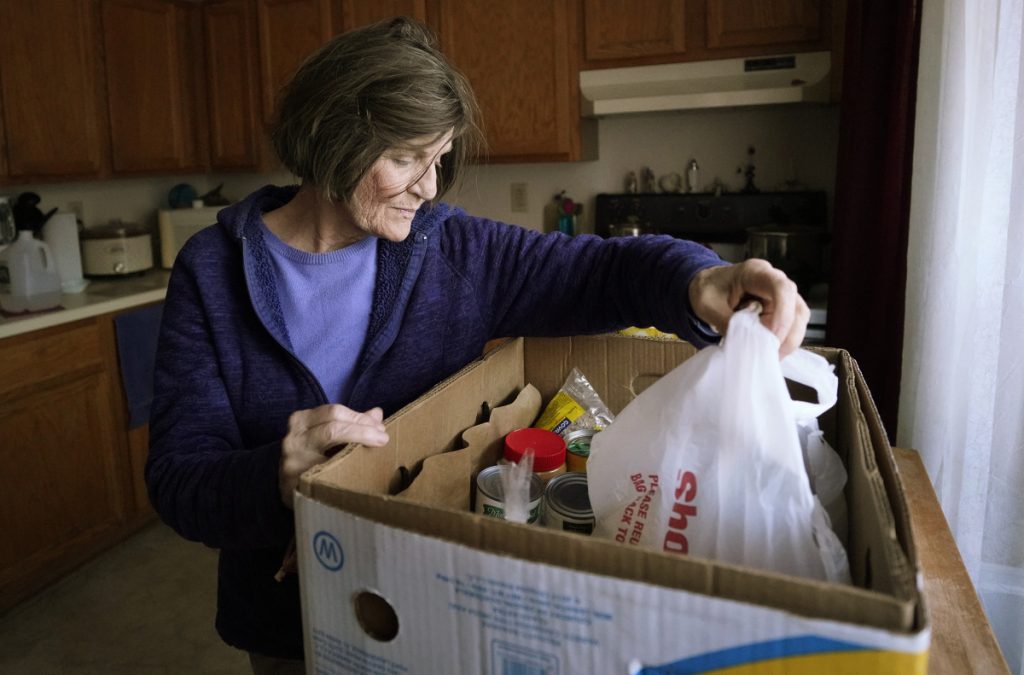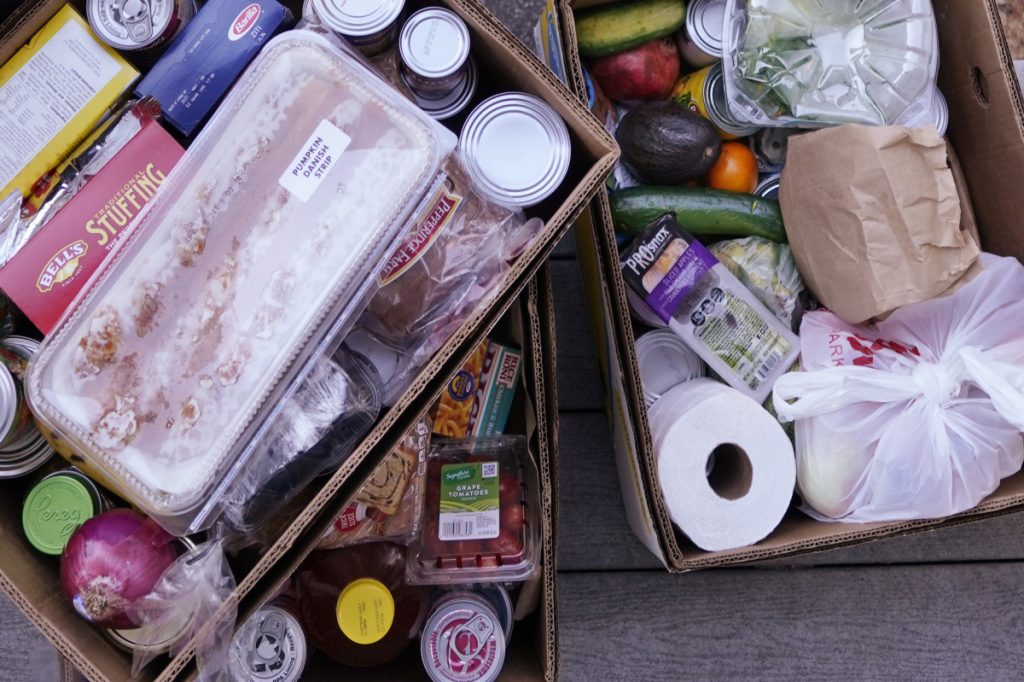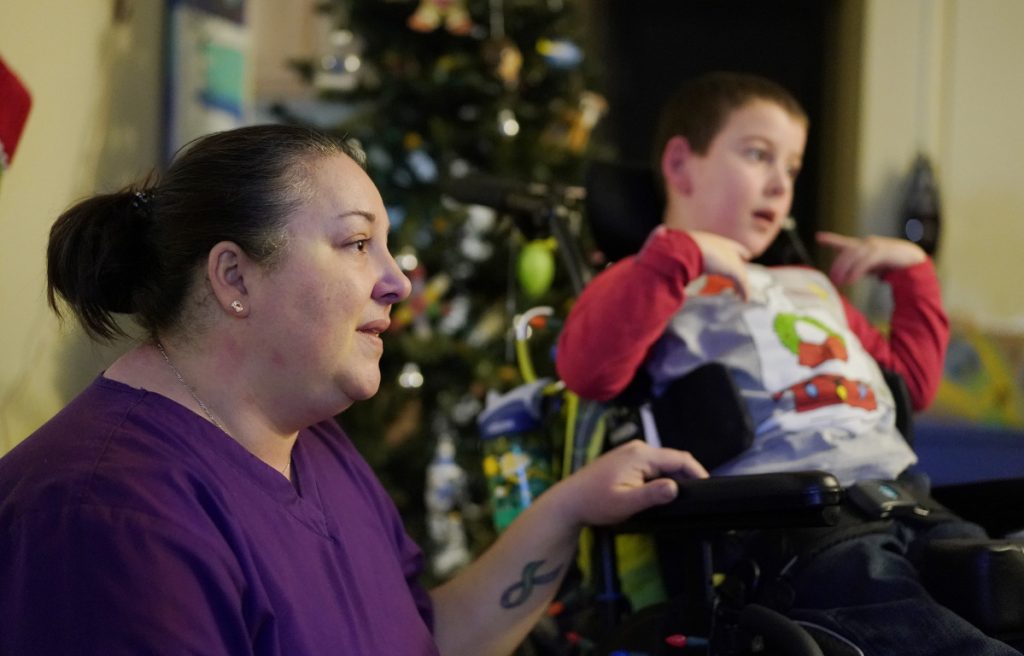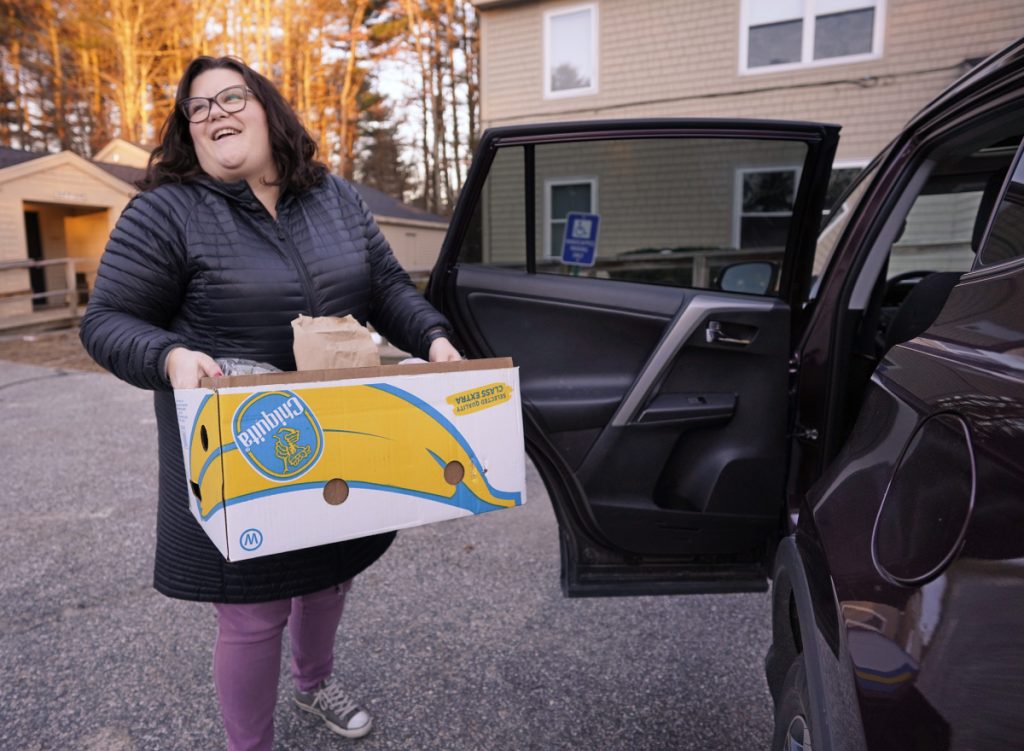POWNAL — At the end of a long dirt road in Pownal, Sarah Lundin spots the children playing, a little girl and boy, snowsuited, pink-cheeked, grinning. Their mother is out walking in the last light, their father is inside, but the boy, who is bigger, happily takes the big box of food from Lundin, the community services coordinator for Freeport Community Services.
This week there’s ground meat inside the box, courtesy of Wolfe’s Neck Farm, which supplies 50 pounds a week to the food pantry at Freeport Community Services. The butternut squash and potatoes come from R. Belanger & Sons Farm in Lewiston. There’s cereal and other staples, enough to help a family of four make it through a week if they’re careful.
Because not everyone can make it to the food pantry during the hours it is open, Freeport Community Services makes home deliveries to families and individuals in need. They might be older Mainers who are disabled – Lundin’s first stop of the day was at the apartment of a woman who uses a wheelchair – or homebound by age or illnesses. Or, as in the case of this family, they might be working families with just one car. What they have in common are food insecurity and transportation problems.
“Limited mobility isn’t just about your physical person,” said Clara McConnell, the director of public affairs for Good Shepherd Food Bank, which partners with Freeport Community Services and more than 400 other agencies throughout the state to feed the needy. More than half of those agencies are food pantries, which she pointed out are not like supermarkets, “where it is open every single day from 6 a.m. to 9 p.m. There are specific hours and it can be very challenging to get to the pantry.”

These segments of the population can be the hardest to reach, McConnell said. Overall in the state, 13.8 percent of all individuals face food insecurity – meaning they don’t know where their next meal is coming from – and 19.8 of children in Maine are food insecure. Cumberland County hews close to those statistics. According to Feeding America’s Map the Meal Gap data, 37,340 Cumberland County residents were food insecure in 2016, or 13 percent of the population. In Cumberland County, 9,760 children, or 17.2 percent of the children in the county, were food insecure.
But even Good Shepherd doesn’t have data on how many Mainers face this particular subset of mobility challenges within the greater problem, or how many local agencies make door-to-door deliveries.
Meals on Wheels, a federal program, serves about 5,000 Mainers over the age of 60. It delivers a little under 600,000 meals annually, according to Jess Maurer, working in partnership with the five Area Agencies on Aging all around the state. But Meals on Wheels can have waiting lists. “Last spring the wait list was about 300,” Maurer said. In those cases, the staff refers people to local pantries. “They know where every meal is, under every rock,” Maurer said.
But as McConnell put it, even with the outreach that food pantries and community groups do, it’s hard to know if they’re reaching everyone in need.
“We don’t know what we don’t know,” McConnell said. “How many people do we just not know about?”
COVERING ALL THE BASES
On this recent Monday, Lundin and volunteer Chris O’Neil headed off in separate cars to visit 13 homes to drop off food. Nancy Cardoza’s apartment was one of the first Lundin visited. The box went on her kitchen table and Cardoza lifted out a roll of toilet paper and began looking through the box. “It’s always fun,” she said.
“These are cool,” she said, holding out a package of baked goods. “They are like biscuits.”
The food can last her a week, especially if enough meat is in it.
“They cover all the bases and then some for my needs,” Cardoza said.
Sometimes, she said, her weekly box is so full she worries about O’Neil getting up the stairs.
“I think he’s going to fall backwards,” she said.

She’s 67, has a bad hip, and doesn’t walk much anymore. She moved to Freeport about four years ago and has been an appreciative client of the home-delivery service since then. So is her cat, Peanut (the pantry packs cat food for her whenever it gets a donation).
“This has been one of the better things that has happened in my life since I moved here, actually,” Cardoza said. “We are not living in a world of giving, so these kinds of things, where people are taking care of the needy, mean a lot.”
PRIDE AND JOY
Across town, in another apartment complex, Megan Bouchard opened the door to Lundin with a welcoming smile. A certified nursing assistant who works at an assisted living facility in Cumberland, she was still in her work scrubs. Her son Trey, 7, was sitting in his wheelchair, wearing a Christmas sweatshirt featuring Snoopy and Woodstock. The home delivery service was new to her, but Freeport Community Services was not. She’s sought their help on and off over the years. “I have asked them for help with Trey for equipment and other things,” she said.

Trey has cerebral palsy and hydrocephalus. His physical problems began with a stroke when he was just 8 days old. His father left soon after Trey was diagnosed with cerebral palsy. The baby was 1. Bouchard struggled, mightily, and then she decided to let it go.
“We learned that you can’t make someone be a father,” she said.
“I had to suck up a lot of pride to ask for help,” Bouchard said. “I had always been so independent, doing things for myself.” Even asking the Department of Health and Human Services for help was hard. “And getting on board with Social Security. But I can say now, I am more comfortable asking for help.”
Recently, it became hard to get to the food pantry, she said.
“The delivery makes it a lot easier for me and my situation,” Bouchard said.

It will likely last her a week. After an early childhood of not being able to eat – he had a tube running through his nose to his belly – Trey now chews and swallows on his own. He isn’t picky about what he eats, Bouchard said. Last week, there was a juice he liked. She reminded him of it, as he sat near the decorated Christmas tree, their cat Brandy (or “B” as Trey calls her) curled around the wheelchair. He shouted a joyful response, his eyes twinkling and she lifted his shirt to show the port for the feeding tube she uses for formula when he needs more calories than he can get from the food she serves him.
He’s her “one and only,” she said, smoothing the shirt back down. “Just you and me, pal. We’re a good team.”

Comments are no longer available on this story